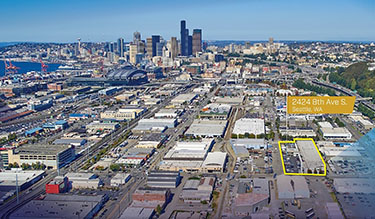|
Subscribe / Renew |
|
|
Contact Us |
|
| ► Subscribe to our Free Weekly Newsletter | |
| home | Welcome, sign in or click here to subscribe. | login |
Real Estate
| |
October 11, 2021
North Coast Electric property in SoDo neighborhood sells for $32M
Real Estate Editor
The 2.5-acre North Coast Electric property in SoDo, at 2424 Eighth Ave. S., has sold for $32 million, according to King County records. The sellers were various trusts associated with the Lemman family, which two years ago sold the business, but not its real estate holdings in Washington, Alaska, Idaho and Oregon. The family had owned the property since 1977.
The buyer was SWIND 2424 8th Avenue Point LLC, which is associated with Staley Point Capital of Los Angeles.
Newmark's Thad Mallory, Taylor Hoff and Cam Warren represented the seller, in a deal worth about $357 per square foot for the existing building. Newmark listed the property late last year for $27 million. The brokers then said that the lease held by Sonepar USA, which now owns North Coast, expires this December.
No significant new plans have been filed for the property. The building totals 89,612 square feet, according to the brokers; it was developed in 1970.
This appears to be Staley Point's first investment in our market. The family-run, privately held firm describes itself as a value-add and opportunistic real estate investor. Founded two years ago by industry veteran Kevin Staley, it's been mostly focused on self-storage and industrial properties in Southern California.
Staley Point has thus far made nine investments via a joint venture with Bain Capital Real Estate. It said a press release will follow this week regarding the SoDo sale.
That Staley Point paid 18% over the asking price for a presumably soon-to-be vacant building reflects the value of a likely future last-mile logistics property. It's right off the freeway's southbound Exit 163B to Sixth Avenue South and Forest Avenue, and only two miles south of Pioneer Square — where North Coast was founded in 1913.
The industrial market remains tight, as the pandemic binge in online shopping shows little sign of abating. In its recent third quarter industrial report, Kidder Mathews said the Seattle close-in vacancy rate was hovering around 3.7%, up slightly from the prior quarter. Asking rates rose by a few pennies to $1.28 per square foot. And the amount of close-in space now under construction is projected to soon add 534,607 square feet.
Looking at the broader region, KM estimates that 2.9 million square feet was absorbed during the third quarter, contributing to 9 million square feet absorbed for the year. KM called that “the highest amount ever, and a good thing, since development activity remains very robust with record high construction volumes.” For the region, extending down to Thurston County, about 10.7 million square feet is in development.
In its third quarter report, Neil Walter Co. places close-in Seattle rents — averaging $1.12 per square foot, by its math — in the upper echelons of major cities. It ranks land-constrained San Francisco highest at $1.96 per square foot, while Seattle is more or less on par with leading markets like New York, Los Angeles and Washington, D.C.
And Cushman & Wakefield's third quarter industrial report for the nation also assigns strong numbers to what it calls the Seattle market — but may mean King County. C&W says the vacancy rate dropped from 6% to 5.7% in the third quarter. That compares to KM's estimated drop of 5.4% to 4.7% for the region; but both agree on the trendline.
At the national level, says C&W, demand outpaced supply for the third consecutive quarter. The year-to-date absorption figure of nearly 366 million square feet is 98% higher than during the first three quarters of 2020 — when the pandemic began its grip.
C&W concludes, “It is no secret that the main driver of this level of demand is the need for more e-commerce and third-party logistics space to keep up with the amount of digital sales of consumer goods exacerbated by the pandemic. Though this trend may have accelerated due to COVID-19, it is here to stay.”
Brian Miller can be
reached by email at brian.miller@djc.com or by phone at (206) 219-6517.



